
by Shaun Chamberlin | Nov 7, 2008 | All Posts, Climate Change, Politics
What with the founding of the new UK Department of Energy and Climate Change (DECC), our Government's commitment to 80% emissions cuts by 2050, the election of Barack Obama, the International Energy Agency acknowledging that "current global trends in energy supply and consumption are patently unsustainable" and the latest shudders of the moribund economic system, a lot has happened since my last post.
In fact I have had a real sense, both through public events and private discussions, that things are starting to shift - that finally a recognition of the collective nature and overwhelming severity of these challenges is starting to spread. That said, at this stage the problems still appear to be worsening more quickly than our awareness is improving and, crucially, the real challenges of the interactions between these crises and the implications of addressing them still remain largely unacknowledged.
One of Barack Obama's campaign promises was to reduce US greenhouse gas emissions by 80 percent by 2050, meaning that both the UK and US are now committed to this target. With their combined political clout, this is undoubtedly an important step in the right direction. Of course many have correctly pointed out that this target is nonetheless both insufficient and not quantified in the right terms, but what has been less widely discussed is the implications of actually achieving this target.
While Al Gore argues that "A political promise to do something 40 years from now is universally ignored because everyone knows it's totally meaningless", we are surely entitled to believe that when our Government commits to legally binding targets there must be at least some intention of their actually being achieved.
Yet no-one is able to explain how we can expect to reduce emissions by 80% by 2050 while continuing to experience a growing economy. Abstract talk of 'decoupling' notwithstanding, the logical conclusion is that the UK and US Governments are now legally obliged to shrink their economies by 2050.
 Of course the economist Kenneth Boulding famously said that "anyone who believes exponential growth can go on forever in a finite world is either a madman or an economist", but make no mistake, inevitable though it may be, the end of economic growth will be a painful process.
Putting all of this within a context of depleting energy resources leads rapidly to the conclusion that everyone's favourite Democrat is going to face one or two challenges over the coming years.
With all this in mind, the belated creation of DECC here in the UK must be seen as a hopeful sign. Minister Ed Miliband and his team have a chance to bring some joined-up thinking to an area where it has been conspicuous by its absence. Two colleagues of mine who have met with Mr. Miliband since his appointment have reported him to be refreshingly honest about his current lack of knowledge in the area. A touch of humility is long overdue in our approach, so I tend to see his eagerness to learn as a very positive indication.
Nonetheless, he will have to be a fast learner. If we adopt a reasonable set of parameters - that we must avoid runaway climate change, that we cannot rely on any energy sources that have not yet been invented - our options are shrinking by the day. It is already clear that reducing our demand for energy will be necessary, and it is equally clear that this could lead to great public outcry as perceived entitlements meet real limitations. Already the tightrope we are walking between climate change and peak oil is starting to fray...
ps Apologies to regular readers for the dearth of posts in the last month. I have been fully committed moving the Transition Timeline project towards completion.
Of course the economist Kenneth Boulding famously said that "anyone who believes exponential growth can go on forever in a finite world is either a madman or an economist", but make no mistake, inevitable though it may be, the end of economic growth will be a painful process.
Putting all of this within a context of depleting energy resources leads rapidly to the conclusion that everyone's favourite Democrat is going to face one or two challenges over the coming years.
With all this in mind, the belated creation of DECC here in the UK must be seen as a hopeful sign. Minister Ed Miliband and his team have a chance to bring some joined-up thinking to an area where it has been conspicuous by its absence. Two colleagues of mine who have met with Mr. Miliband since his appointment have reported him to be refreshingly honest about his current lack of knowledge in the area. A touch of humility is long overdue in our approach, so I tend to see his eagerness to learn as a very positive indication.
Nonetheless, he will have to be a fast learner. If we adopt a reasonable set of parameters - that we must avoid runaway climate change, that we cannot rely on any energy sources that have not yet been invented - our options are shrinking by the day. It is already clear that reducing our demand for energy will be necessary, and it is equally clear that this could lead to great public outcry as perceived entitlements meet real limitations. Already the tightrope we are walking between climate change and peak oil is starting to fray...
ps Apologies to regular readers for the dearth of posts in the last month. I have been fully committed moving the Transition Timeline project towards completion. It's now looking good and should be publicly launched next month. I look forward to hearing what you think, and should be posting more regularly again from now on. Edit - Seems I spoke too soon! The Transition Timeline is now being published as a book by Green Books, and so will be launched March 2009.
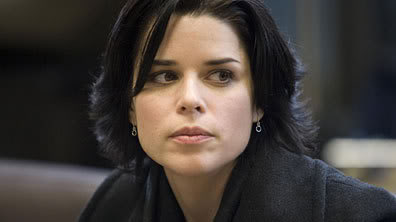
by Shaun Chamberlin | Jul 27, 2008 | All Posts, Climate Change, Cultural stories, Peak Oil, Politics, Reviews and recommendations
I have just watched the BBC's outstanding thriller Burn Up, starring Rupert Penry-Jones, Marc Warren, Bradley Whitford and Neve Campbell (trailer available here).
It is a dramatic account of the intrigue, betrayal, sex and violence surrounding characters in the oil industry, international diplomacy and the environmental movement in the build up to the international conference that will decide on the successor to the Kyoto Protocol. For those who haven't yet seen it, be aware that the discussion below the cut contains spoilers.
Right, so you've seen it now - what did you think? Personally, despite the supposedly 'stellar' cast I thought some of the acting was a bit below-par, but I was shocked in the best possible way by the direction the script took.
Against all my expectations of a prime-time major channel drama this was a fascinating attempt to engage with and dramatise the over-riding tension of our times, between the depletion of the fossil-fuel resources which fuel our globalised way of life, and the growing consequences of the emissions those fuels produce.
It was great to see the scientist in the film stating that we have only 5-10 years to avoid irreversible runaway climate change - to me that is the bottom line - but the section that particularly fascinated me was the ending.
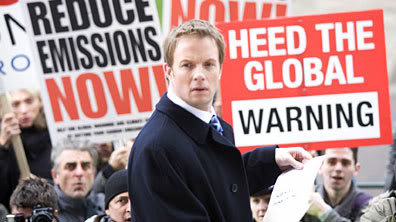 One man alone ends up holding incontrovertible evidence that Saudi oil production is in decline, and so that Peak Oil truly is already in the past, and he faces a dilemma. Does he tell the world, so that we can start work in earnest on the transition to a low-carbon future, or does he keep it to himself, since he knows full well that this information would spread panic throughout the financial markets, plunging us into global economic depression, prompting energy wars and causing suffering throughout the world.
His dilemma represents the very real tension our world faces. Our global economies are dependent on both growing supplies of accessible fossil fuels and a stable climate, so we know that our carbon-intensive way of life will end, one way or another. Yet we have now left it too late for a gentle, gradual transition to a low-carbon economy, so we can see that the crash of our existing systems, when it comes, will be painful.
This creates an instinctive desire to put it off as long as possible, but the longer we persist in our current fuel-wasting, carbon-emitting ways the faster and more vicious the crash will be. We know we really ought to go to the dentist, but maybe we can put it off for just one more year...
The pace of Burn Up seemed to speed up dramatically towards the end, and some friends less immersed in this field told me they had trouble keeping up with it all, but in essence it ended with our hero deciding to leak the information, and the credits rolled to the sound of radio news broadcasts apparently indicating the global economy falling apart as the implications of the reality-check reverberated around the world.
I must confess that when I wrote last month about the thought that economic collapse might be the only remaining solution to global warming, the last thing I expected was to be encountering the idea on prime-time TV so soon.
"The world doesn't have to go to hell Mack, just the economy. You're right, this information will cause the biggest powerdown we've ever seen. But you cut world manufacturing in half you cut CO2 emissions in half. Look it may not be tomorrow, it may not be next week, next month, who knows when but the crash is coming."
The battle of cultural stories continues...
--
ps Since writing this post, I have been pointed at this fascinating interview with the writer of Burn Up.
One man alone ends up holding incontrovertible evidence that Saudi oil production is in decline, and so that Peak Oil truly is already in the past, and he faces a dilemma. Does he tell the world, so that we can start work in earnest on the transition to a low-carbon future, or does he keep it to himself, since he knows full well that this information would spread panic throughout the financial markets, plunging us into global economic depression, prompting energy wars and causing suffering throughout the world.
His dilemma represents the very real tension our world faces. Our global economies are dependent on both growing supplies of accessible fossil fuels and a stable climate, so we know that our carbon-intensive way of life will end, one way or another. Yet we have now left it too late for a gentle, gradual transition to a low-carbon economy, so we can see that the crash of our existing systems, when it comes, will be painful.
This creates an instinctive desire to put it off as long as possible, but the longer we persist in our current fuel-wasting, carbon-emitting ways the faster and more vicious the crash will be. We know we really ought to go to the dentist, but maybe we can put it off for just one more year...
The pace of Burn Up seemed to speed up dramatically towards the end, and some friends less immersed in this field told me they had trouble keeping up with it all, but in essence it ended with our hero deciding to leak the information, and the credits rolled to the sound of radio news broadcasts apparently indicating the global economy falling apart as the implications of the reality-check reverberated around the world.
I must confess that when I wrote last month about the thought that economic collapse might be the only remaining solution to global warming, the last thing I expected was to be encountering the idea on prime-time TV so soon.
"The world doesn't have to go to hell Mack, just the economy. You're right, this information will cause the biggest powerdown we've ever seen. But you cut world manufacturing in half you cut CO2 emissions in half. Look it may not be tomorrow, it may not be next week, next month, who knows when but the crash is coming."
The battle of cultural stories continues...
--
ps Since writing this post, I have been pointed at this fascinating interview with the writer of Burn Up.
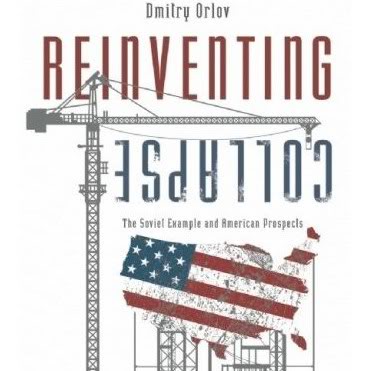
by Shaun Chamberlin | Jun 29, 2008 | All Posts, Climate Change, Cultural stories, Favourite posts, Peak Oil, Philosophy, Reviews and recommendations, TEQs (Tradable Energy Quotas), Transition Movement
As George Carlin once said, "they call it the American dream because you have to be asleep to believe in it".
At the risk of this blog becoming 'review corner', that seems the perfect introduction to the book I just finished reading - Dmitry Orlov's brilliantly enjoyable Reinventing Collapse. This is a true work of dark optimism, with a fair dash of dark humour to boot.
In it, Orlov draws on his experiences of the collapse of the Soviet Union to explore the future American residents like him are likely to face as the effects of the USA's disastrous economic, energy and foreign policies take hold.
Orlov highlights that economic collapse is not, in fact, the unthinkable end of the world, but rather simply a new set of historical circumstances within which to exist. This is a critically important and inherently dark subject, yet the book is suffused with subtle humour, to the extent that at times you are not quite sure when Orlov is serious and when he's joking. The answer, invariably, is both.
This deep humour is an apt way to stimulate further thought in the reader, and after the initial laughter I regularly found myself drawn into a contemplation that led me to Orlov's insights laying beneath.
One subtext particularly intrigued me. While Orlov argues that the collapse of the US economy is inevitable (I would agree), and will surely be extremely difficult for most of those living through it, various asides implied to me that it could be considered in some respects desirable.
This interests me in the context of the desperate urgency of the global climate change situation. As Dr. James Hansen chillingly put it in his recent paper, it is simply becoming a question of whether "humanity wishes to preserve a planet similar to that on which civilization developed and to which life on Earth is adapted". On his reading of the science (and I trust him) we now have less than seven years to decide.
Bearing these stakes in mind, it is interesting to note that Chris Vernon of The Oil Drum quotes the statistic that Russia's carbon emissions fell 31% in the 5 years from the end of the Soviet Union in 1991. Ignoring for a moment all the other effects of that economic collapse, and considering that the weight of evidence tends to suggest that a 'great turning' of the global paradigm may not be likely to take place in time, I am led to ponder whether economic collapse is actually what we should be hoping for - does it represent our best bet for reducing emissions sufficiently quickly to retain a habitable climate on our planet?
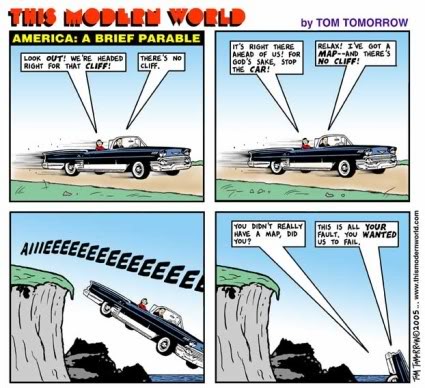 I have written before about my belief that while climate change and peak oil represent the greatest direct threat facing humanity today, they are really only symptoms of a deeper problem. Humanity’s obsession with growth means that if we could wish away the excess CO2 in our atmosphere and generate unlimited oil we would still quickly find our unsustainable way of life pressing up against the next environmental limit, be it food shortages, air pollution, species extinctions or whatever.
And in turn this growth obsession is a symptom of the underlying cultural stories and philosophies we use to make sense of our lives and find meaning. Our cultural stories define us and strongly impact our behaviours. An example of a dominant story in our present culture is that of “progress” - the story that we currently live in one of the most advanced civilisations the world has ever known, and that we are advancing further and faster all the time. The definition of 'advancement' is vague – though tied in with concepts like scientific and technological progress – but the story is powerfully held. And if we hold to this cultural story then 'business as usual' is an attractive prospect – a continuation of this astonishing advancement. Similarly the cultural story that “fundamental change is impossible” makes it seem inevitable.
Yet even UK Prime Minister Gordon Brown admitted last week that,
“The fact is that a low carbon society will not emerge from thinking of business as usual”
The problem with stories comes when they shape our thinking in ways that do not reflect reality. The evidence might support the view that this 'advanced' culture is not making us happy and is rapidly destroying our environment's ability to support us, it might show that dramatic change is both common and inevitable, but dominant cultural stories are powerful magics, and those who challenge them tend to meet resistance and even ridicule.
Nonetheless, my work now focuses on changing these dominant cultural stories - and thus changing our patterns of thought and behaviour - as I see this as the key to equipping our society to deal with the pressing challenges of climate change and peak oil. TEQs, the Transition movement and the various other initiatives listed on my links page (as well as this blog of course!) seem to me to provide the best possibilities for starting to shift our cultural paradigm.
But perhaps this effort is too little too late? And perhaps by trying to move our society a little closer to long-term sustainability we are in fact just prolonging its existence, and thus prolonging its ability to pump emissions into our atmosphere...
I have written before about my belief that while climate change and peak oil represent the greatest direct threat facing humanity today, they are really only symptoms of a deeper problem. Humanity’s obsession with growth means that if we could wish away the excess CO2 in our atmosphere and generate unlimited oil we would still quickly find our unsustainable way of life pressing up against the next environmental limit, be it food shortages, air pollution, species extinctions or whatever.
And in turn this growth obsession is a symptom of the underlying cultural stories and philosophies we use to make sense of our lives and find meaning. Our cultural stories define us and strongly impact our behaviours. An example of a dominant story in our present culture is that of “progress” - the story that we currently live in one of the most advanced civilisations the world has ever known, and that we are advancing further and faster all the time. The definition of 'advancement' is vague – though tied in with concepts like scientific and technological progress – but the story is powerfully held. And if we hold to this cultural story then 'business as usual' is an attractive prospect – a continuation of this astonishing advancement. Similarly the cultural story that “fundamental change is impossible” makes it seem inevitable.
Yet even UK Prime Minister Gordon Brown admitted last week that,
“The fact is that a low carbon society will not emerge from thinking of business as usual”
The problem with stories comes when they shape our thinking in ways that do not reflect reality. The evidence might support the view that this 'advanced' culture is not making us happy and is rapidly destroying our environment's ability to support us, it might show that dramatic change is both common and inevitable, but dominant cultural stories are powerful magics, and those who challenge them tend to meet resistance and even ridicule.
Nonetheless, my work now focuses on changing these dominant cultural stories - and thus changing our patterns of thought and behaviour - as I see this as the key to equipping our society to deal with the pressing challenges of climate change and peak oil. TEQs, the Transition movement and the various other initiatives listed on my links page (as well as this blog of course!) seem to me to provide the best possibilities for starting to shift our cultural paradigm.
But perhaps this effort is too little too late? And perhaps by trying to move our society a little closer to long-term sustainability we are in fact just prolonging its existence, and thus prolonging its ability to pump emissions into our atmosphere...
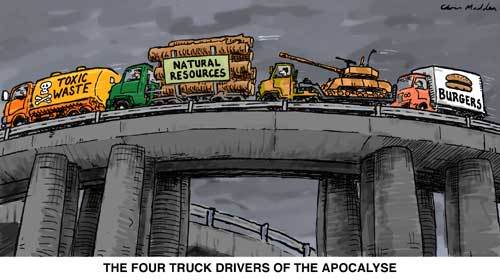 Does our need for a relatively benign climate logically dictate that we should be striving to bring about economic collapse sooner rather than later?
It is an interesting question, and one that we may need to revisit, but my answer is still no. The human suffering caused by such a sudden collapse is overwhelming, and I believe that kinder options are still open to us.
Personally, I believe we still have a chance. I still believe, firstly, that a long-term future for humanity is possible, and secondly that we have a shot at developing a society that responds in a humane way to the crises we face. And I will fight for that possibility for as long as I believe in it and still see a chance that it exists, even as the window of possibility continues to shrink.
When it comes down to it, at the deepest level it doesn’t really matter to me whether or not it is probable that we succeed. As Tom Atlee has written,
“Probabilities are abstractions. Possibilities are the stuff of life, visions to act upon, doors to walk through.”
I will walk through the doors that inspire me.
Of course, there is a side of me that asks "but what if we do reach a time when the evidence is clear - when there is no longer any chance of avoiding the devastation of our climate". If we were on the Titanic and we had already hit the iceberg there would be little point in trying to patch the hole as the waters raged in - so what then?
Well, the trite answer would be that there's quite enough to worry about now without concerning myself with that. The more interesting answer comes back to what we believe life is fundamentally about, but that will have to wait for a future post.
Oh, and just what does Dmitry Orlov suggest in terms of personally adapting to an economic collapse? Well, you'll have to read his book for that!
Does our need for a relatively benign climate logically dictate that we should be striving to bring about economic collapse sooner rather than later?
It is an interesting question, and one that we may need to revisit, but my answer is still no. The human suffering caused by such a sudden collapse is overwhelming, and I believe that kinder options are still open to us.
Personally, I believe we still have a chance. I still believe, firstly, that a long-term future for humanity is possible, and secondly that we have a shot at developing a society that responds in a humane way to the crises we face. And I will fight for that possibility for as long as I believe in it and still see a chance that it exists, even as the window of possibility continues to shrink.
When it comes down to it, at the deepest level it doesn’t really matter to me whether or not it is probable that we succeed. As Tom Atlee has written,
“Probabilities are abstractions. Possibilities are the stuff of life, visions to act upon, doors to walk through.”
I will walk through the doors that inspire me.
Of course, there is a side of me that asks "but what if we do reach a time when the evidence is clear - when there is no longer any chance of avoiding the devastation of our climate". If we were on the Titanic and we had already hit the iceberg there would be little point in trying to patch the hole as the waters raged in - so what then?
Well, the trite answer would be that there's quite enough to worry about now without concerning myself with that. The more interesting answer comes back to what we believe life is fundamentally about, but that will have to wait for a future post.
Oh, and just what does Dmitry Orlov suggest in terms of personally adapting to an economic collapse? Well, you'll have to read his book for that!




 One man alone ends up holding incontrovertible evidence that Saudi oil production is in decline, and so that
One man alone ends up holding incontrovertible evidence that Saudi oil production is in decline, and so that 
 I have
I have  Does our need for a relatively benign climate logically dictate that we should be striving to bring about economic collapse sooner rather than later?
It is an interesting question, and one that we may need to revisit, but my answer is still no. The human suffering caused by such a sudden collapse is overwhelming, and I believe that kinder options are still open to us.
Personally, I believe we still have a chance. I still believe, firstly, that a long-term future for humanity is possible, and secondly that we have a shot at developing a society that responds in a humane way to the crises we face. And I will fight for that possibility for as long as I believe in it and still see a chance that it exists, even as the window of possibility continues to shrink.
When it comes down to it, at the deepest level it doesn’t really matter to me whether or not it is probable that we succeed. As Tom Atlee has written,
“Probabilities are abstractions. Possibilities are the stuff of life, visions to act upon, doors to walk through.”
I will walk through the doors that inspire me.
Of course, there is a side of me that asks "but what if we do reach a time when the evidence is clear - when there is no longer any chance of avoiding the devastation of our climate". If we were on the Titanic and we had already hit the iceberg there would be little point in trying to patch the hole as the waters raged in - so what then?
Well, the trite answer would be that there's quite enough to worry about now without concerning myself with that. The more interesting answer comes back to what we believe life is fundamentally about, but that will have to wait for a future post.
Oh, and just what does Dmitry Orlov suggest in terms of personally adapting to an economic collapse? Well, you'll have to
Does our need for a relatively benign climate logically dictate that we should be striving to bring about economic collapse sooner rather than later?
It is an interesting question, and one that we may need to revisit, but my answer is still no. The human suffering caused by such a sudden collapse is overwhelming, and I believe that kinder options are still open to us.
Personally, I believe we still have a chance. I still believe, firstly, that a long-term future for humanity is possible, and secondly that we have a shot at developing a society that responds in a humane way to the crises we face. And I will fight for that possibility for as long as I believe in it and still see a chance that it exists, even as the window of possibility continues to shrink.
When it comes down to it, at the deepest level it doesn’t really matter to me whether or not it is probable that we succeed. As Tom Atlee has written,
“Probabilities are abstractions. Possibilities are the stuff of life, visions to act upon, doors to walk through.”
I will walk through the doors that inspire me.
Of course, there is a side of me that asks "but what if we do reach a time when the evidence is clear - when there is no longer any chance of avoiding the devastation of our climate". If we were on the Titanic and we had already hit the iceberg there would be little point in trying to patch the hole as the waters raged in - so what then?
Well, the trite answer would be that there's quite enough to worry about now without concerning myself with that. The more interesting answer comes back to what we believe life is fundamentally about, but that will have to wait for a future post.
Oh, and just what does Dmitry Orlov suggest in terms of personally adapting to an economic collapse? Well, you'll have to
Recent Comments